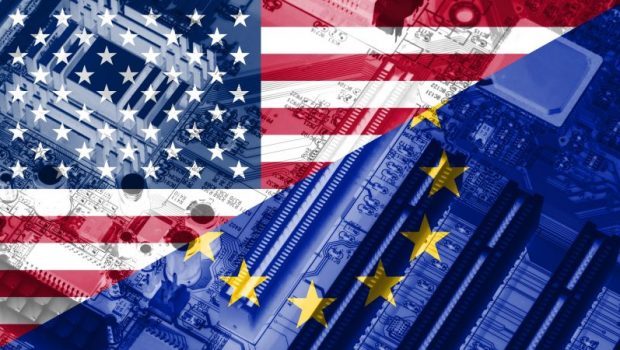Trade and Technology Council draft statement reveals top priorities for transatlantic talks – EURACTIV.com
The main areas where the EU and US will seek convergence are foreign investments, export control, AI and semiconductors, according to a joint statement leaked to EURACTIV.
The Trade and Technology Council is an EU-US initiative to find common positions on critical issues related to global trade and emerging technologies. The first meeting is planned to take place in Pittsburgh next week (29 September).
However, France has been pushing to postpone the summit to next month, following an agreement between Australia, the United Kingdom and the United States that sidelines the EU country on a crucial defence contract.
Several member states including Austria, Germany, Ireland, Italy and the Netherlands have been pushing against the French request, a source informed on the matter told EURACTIV.
In spite of statements from French Commissioner Thierry Breton that “something is broken” in transatlantic relations, the postponement is still under consideration.
Regardless of the timeline, the main pain points of the transatlantic summit are likely to stick. Discussions on foreign investments and export control seem targeted (but not limited) to China. The two partners also seek to establish common principles on artificial intelligence and better cooperation on semiconductor value chains.
The negotiations on a privacy agreement for international data transfers are not part of the conclusions, as requested by the European counterpart.
Foreign investments
The joint statement recognises the importance of an attentive screening of foreign takeovers complemented by “appropriate” enforcement mechanisms and based on the 2009 OECD Guidelines.
“We intend to maintain investment screening regimes in order exclusively to address risks for national security and, within the EU, public order,” the document reads
The two blocs will meet periodically in a dedicated working group to exchange on trends and best practices. Multilateral cooperation will also be sought with other international partners.
In May, the Commission presented a proposal that would require companies supported by foreign governments to demand EU approval before taking over strategic European assets.
Export control
According to the joint statement, export controls are considered “necessary to ensure compliance with our international obligations and commitments,” notably for effectively protecting international security and a global level playing field.
The document refers in particular to emerging technologies that raise serious concerns when applied to the field of defence and security, with potential implications for human rights.
“The EU and the US acknowledge the need for controls on trade in certain dual-use items, in particular certain cyber-surveillance technologies, in order to prevent their misuse in ways which might lead to serious violations of human rights or international humanitarian law,” the statement continues.
In other words, the two partners commit to a coordinated approach in effectively controlling transfers of sensitive technologies. The reference is explicitly concerning the Pegasus affairs, which saw Israeli security firm NSO selling a powerful hacking software to several authoritarian regimes.
Artificial Intelligence
Another point where the EU and US are trying to find a common understanding is artificial intelligence. In April, the Commission launched one of the most ambitious legislative proposals on this technology and wanted to establish it as the global standard.
Much of the wording in the joint statement echoes the EU proposal, emphasising that the development of AI should be human-centric and based on trustworthiness. The two blocs also agree on using a risk-based approach, “which allows society to reap the benefits of AI while ensuring the necessary level of protection.”
The document goes even one step further, stating that the EU and US are aiming “at convergence on principles that underlie our cooperation and will exchange on a mutual understanding of their implementation.” [bold not added]
Future projects on machine learning and other AI systems are envisaged for future cooperation and a working group is established to identify common standards.
Semiconductors
The global shortage of semiconductors has prompted most economic powers to try to boost their strategic capacity. That is also the case for the EU and US, which are now seeking to better cooperate on this critical supply chain based on their respective strengths.
“We underline the importance of jointly identifying gaps in the semiconductors value chain, and strengthening our domestic semiconductor ecosystems, from, research, design to manufacturing, with a view to improving resilience, through consultation with stakeholders, and the right incentives,” the joint declarations says.
The shared commitment is to avoid a subsidy race, as it would have a chilling effect on private investments.
The strategic supply of semiconductors also links back to the control over foreign investments, as the two blocs see the “risk arising from certain foreign investments” and commit to a coordinated approach when blocking foreign takeovers.
Other working groups will cover global trade, climate and clean technologies, security and competitiveness of the ICT supply chains, threats to human rights and the digital uptake of small and medium-sized companies (SMEs).












Gloss